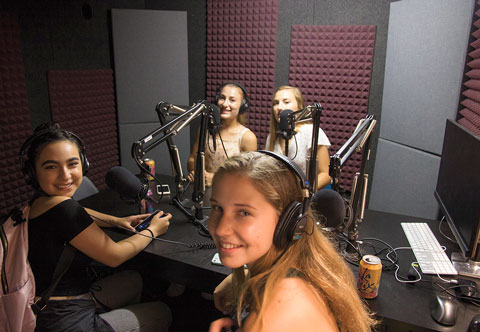INTERVIEW - August, 2018
BuzzFeed 2018
FastForward Interviews Producer Julia Furlan
REPORTERS: Kylar Flynn, Brandon Lopez, Kyle Austin, Simone Harper, Angie Gonzalez, Jacqui Martin, Lauren McKechnie, Claire McKechnie, Samantha Michaels, Josh Santos, Anna Silverman, Lilli Wanninger
If there’s one word to describe life in New York City, it’s fast.The town that never sleeps also never misses a beat, taxis honking and subways rumbling beneath the pavement day and night. Julia Furlan, like most other people who work in media among its sprawling skyscrapers, never goes a day without a rush of motion and activity. NYC is bustling with people, each person just one among millions of different intersecting lives. In this age of social media and constant information, the internet resembles the bustle of a major city more and more closely: every day, torrents of information, messages, videos, and images are sent back and forth across timelines and news feeds that infinitely post and re-post what millions of different people are saying, witnessing, or doing. For conventional media (i.e. television and print), telling the stories of even just the millions walking NYC’s streets can be extremely difficult. After all, there are only so many hours a day that a TV network can fill, and only so much time to tell each story they cover. In hindsight it seems inevitable that, as our lives changed and became more interconnected through technology, the media we absorb would change too.
Julia Furlan is a part of this new frontier. As a producer for BuzzFeed’s podcasting department, she stands at the forefront of today’s ever-evolving media landscape. The behemoth that is BuzzFeed has become as universal in our culture as Facebook and Twitter, and what began as a place for cat-pics and Harry Potter quizzes has emerged in recent years as a pre-eminent source for news and original entertainment. Journalism, cooking shows, trivia, historic photography, celebrity news, you name it: if it’s something shaking up culture and the world, BuzzFeed will likely be covering it. And on top of that, they can cover current events at a speed exponentially greater than TV news could have dreamed just a few short years ago. In an age where we can share any information we want with each other instantly, Julia and her companions at BuzzFeed hold themselves to the highest standard in keeping up with trends, news, and what’s on the mind of everyday people.
 Julia started her career in traditional media. As she said upon greeting us at BuzzFeed’s headquarters: “I came from public media. I used to work at WNYC, which is the local public radio station here in New York - one of many, but it’s the biggest one. I feel like that newsroom and that environment works at a different pace… here it’s much faster.” The transition from classic radio broadcasting to the constant status updates of online reporting was certainly jarring, but it ultimately taught her invaluable skills that made her a podcasting powerhouse. Julia spends most of her week churning out content for her department; the sheer willpower to constantly keep up with current event and create content surrounding them is impressive enough on its own, let alone the fact that her content is for one of the world’s most famous media conglomerates. Getting such a position was no easy feat: the night before her job interview, Julia stayed awake past 2 AM making a website about audio to present the interviewer. Before that, she had gone from publication to station to publication hustling as an editor and freelancer, just trying to make NYC’s high rent. For a person working in the arts in New York, opportunities can be limited, and Julia would waste no time proving her mettle to such a prestigious potential employer. “I think that (the website) was what got me the job,” she chuckled, “because I was so gung-ho about it.”
Julia started her career in traditional media. As she said upon greeting us at BuzzFeed’s headquarters: “I came from public media. I used to work at WNYC, which is the local public radio station here in New York - one of many, but it’s the biggest one. I feel like that newsroom and that environment works at a different pace… here it’s much faster.” The transition from classic radio broadcasting to the constant status updates of online reporting was certainly jarring, but it ultimately taught her invaluable skills that made her a podcasting powerhouse. Julia spends most of her week churning out content for her department; the sheer willpower to constantly keep up with current event and create content surrounding them is impressive enough on its own, let alone the fact that her content is for one of the world’s most famous media conglomerates. Getting such a position was no easy feat: the night before her job interview, Julia stayed awake past 2 AM making a website about audio to present the interviewer. Before that, she had gone from publication to station to publication hustling as an editor and freelancer, just trying to make NYC’s high rent. For a person working in the arts in New York, opportunities can be limited, and Julia would waste no time proving her mettle to such a prestigious potential employer. “I think that (the website) was what got me the job,” she chuckled, “because I was so gung-ho about it.”
Despite BuzzFeed’s immense scale, however, Julia’s team is surprisingly small. “I think the best part of my job, is the creative problem solving that comes from working on a really small team. We have essentially six people and we make one, two, three, four, five, six, seven, eight shows a week.” The ‘eight shows’ reveal was certainly shocking to hear: imagine working on a six-person team that would have to sometimes make multiple podcasts in one day. The level of motivation and creativity that goes into each person’s work cannot be understated when producing high quality media at such a modern pace. The camaraderie of Julia’s team comes also from how distinct they are even within their own company. She explained that podcasting works differently than the conventional visual media on BuzzFeed. “If you publish something on the internet, everyone is going to tweet hate mail if it’s bad. Podcasts are a little more separate. You don’t have a direct response from your audience.” This, however, would not deter Julia’s team from giving utmost consideration to what pieces they should cover and why. Every audience is considered, every topic is given thorough research, and every script is edited to air-tight perfection. In a way, it appears that the rest of the media world’s dismissal of BuzzFeed may have been the ultimate motivation for this team: to have proven themselves legitimate news is now an even greater victory.
If you publish something on the internet, everyone is going to tweet hate mail if it’s bad. Podcasts are a little more separate. You don’t have a direct response from your audience.
For them, the cat-pics of yesteryear are a distant memory compared to the breadth of topics BuzzFeed covers now. For instance, Julia’s team was working on several vital political and social stories the week we visited: “This week’s show… we had a big interview about Facebook and (its) moral reckoning…” The debate about privacy and the responsibility of Silicon Valley tech firms is a very heavy topic for a company also known for managing one of the most popular cooking blogs on the web: this doesn’t detract, but rather strengthens BuzzFeed’s reputation — to many of us, it is all the more impressive how delicately and succinctly this same organization now tackles such complex issues. Tech is of course just one topic covered by BuzzFeed’s thriving journalism department. One of the shows, Julia told us, is called “See Something, Say Something.” The show centers around being Muslim in America, but it doesn’t translate every single word or explain every cultural practice for a white, English speaking audience. “… if you’re (not Muslim) and you’re listening to this show, it is your job…as a person from the outside to do your own research, google it yourself, understand for yourself.” Once again, BuzzFeed is breaking boundaries in its unique reporting.
Elaborating on how BuzzFeed can walk the line between serious political journalism and its original identity releasing meme-worthy entertainment, Julia said, “We have a wide range of things. We have investigations. We have culture pieces. We have criticism. We have breaking news. We have everything.” Though their commitment to covering as many diverse topics as possible plays to their strength and work ethic, Julia believes there is another factor that is most important for her team’s content. “What’s most important is that the writing here is extremely clear, extremely good at guiding a reader through it, because if you’re not (holding their attention) you’re going to lose them. The internet is a big place.”
In creating as engaging of an online experience as possible, BuzzFeed has paved its own way to becoming an American institution. The ability to keep their users’ attention, combined with the flexibility to embrace powerful, new ideas has kept success going well throughout the last decade and onward. Julia added, “BuzzFeed was one of the first places I worked at that was actively feminist and really interested and rooted in a sense of feminism as a value system we should all uphold. The same goes for LGBT rights and civil rights in general. That is something that I find unique and really important.”
 In a time when such rampant xenophobia and hatred has been brought to the forefront of American politics, places like BuzzFeed continue to represent an ideal of inclusivity and tolerance that millennials can be inspired by. With BuzzFeed promoting compassion among people in a way that even kids can understand, then perhaps it’s helped make the world a little better already. As long as determined producers like Julia Furlan make the cogs of BuzzFeed’s headquarters turn, there will always be a place for the political, the cultural, and for outsiders in our country’s media, at a time when having a place provide such things has never been so important. If you’re the type of person who likes to work hard, exercise your creativity, and make a difference, an outlet like BuzzFeed may be a place for you to speak truth to power, and inform the general public around the clock. In a few years, just maybe, you’ll be working alongside Julia and the fellow journalists for a team that, in true New York fashion, never sleeps.
In a time when such rampant xenophobia and hatred has been brought to the forefront of American politics, places like BuzzFeed continue to represent an ideal of inclusivity and tolerance that millennials can be inspired by. With BuzzFeed promoting compassion among people in a way that even kids can understand, then perhaps it’s helped make the world a little better already. As long as determined producers like Julia Furlan make the cogs of BuzzFeed’s headquarters turn, there will always be a place for the political, the cultural, and for outsiders in our country’s media, at a time when having a place provide such things has never been so important. If you’re the type of person who likes to work hard, exercise your creativity, and make a difference, an outlet like BuzzFeed may be a place for you to speak truth to power, and inform the general public around the clock. In a few years, just maybe, you’ll be working alongside Julia and the fellow journalists for a team that, in true New York fashion, never sleeps.

